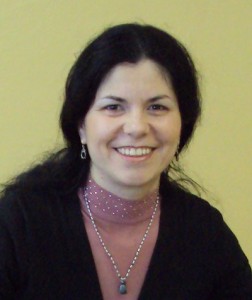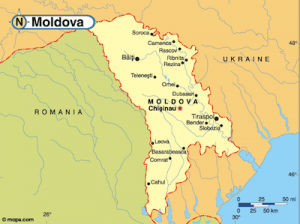
The driver muttered “congratulations” as I stepped out of the maxi-taxi, a van better suited to hauling furniture than people.
I did a double take. My first thought: how could this bus driver know that my birthday was coming up? “Cordial” is not a word I’d associate with bus drivers in Moldova. I was caught off guard by this sudden flush of feeling.
As a Peace Corps volunteer in Moldova (2002-04). Moldova was kind to me and taught me so many things. One of those things is that if you step outside of the U.S., International Women’s Day is kind of a big deal. Friends, students, strangers will congratulate you, just for being a woman. Flowers and candy may be involved.
The day subsumes Mother’s Day and makes it even bigger. I like its spirit of equality, the way compliments shower down on the young and old alike.
I didn’t think too hard that, at least in Moldova, the day might also gloss over a year’s worth of inequalities. Were the jealous and controlling husbands, the incessant questions about marriage, the unwritten rule that my host brothers could have free time in winter when the field work was done but my host sister never got a break from kitchen duty, the comment from a fellowship applicant that he should be chosen for the award because he wouldn’t have a baby and stop working–were these to be paid for by a bouquet of flowers from a street vendor? I didn’t think so much about it then, while I ate my chocolates and swilled my cognac. But I’m still thinking about it now.

I asked one of my dearest friends, Liliana Nederita, about her take on International Women’s Day. Liliana (pictured above) is an English teacher at George Calinescu Lyceum in Chisinau, Republic of Moldova. She has a degree in Psychology. Of her vocation, Liliana says “Iworked as aschool psychologist for five years before I understood that psychology interested me more as a hobby and started teaching English. I have been teaching English for 9 years and I love it.” She lives in Chisinau with her husband and two children, Madalina and Teodor.
WanderChic: How is International Women’s Day celebrated in Moldova?
Liliana Nederita: The way I have seen it celebrated it was more of a get together/party, when the grownup children come with gifts to their mothers and there’s a big Moldovan “masa” which is prepared by the mother. This reminds me of Stephen Leacock’s story “How we kept mother’s day,” when the holiday in the mother’s name turns into additional chores for mother in order to make everybody (except her) feel good.
Sometimes the “fini” come to their “nănași.” We have a custom that at a wedding, a Moldovan couple (the “fini”) takes as “guardians” of their union an older couple which they call “nănași.” In this case, the “nanasi” prepare the mass. But it is not so bad, as it is one more occasion to get together and to spend some time with people that you don’t see daily.
WC: Has this changed over the years?
LN: I believe it has changed since the Soviet times when there was a parade, fireworks and gifts at your place of work (the director of any organization gave either gifts or money to all the staff women on that day). Now some of the businesses keep that tradition and some don’t.
WC: How do you personally celebrate it?
LN: Every year on March 8, we go to our “nanasi” who always have a party and masa on this day. I dress up and I always apply make-up. I never forget to call and send presents to my mother and mother-in-law. And I like to treat myself on this day.
I like that it is a special holiday for women and not only for mothers. It is a holiday when I look in the mirror and like myself because the day before I start to pluck my eyebrows (which I haven’t had time to pluck for a long time because of chores and work), paint my nails, apply a mask, go shopping a buy something new so that I look good the next day.
And this is a day when I feel solely a woman, not someone that goes to work. It is a holiday that brings back the idea of feminine, when I wear a slinky dress and high-heels, have my hair done or even a haircut, when I don’t want to be comfortable wearing jeans and sneakers.
WC: Do you think it’s an important holiday now, or is it old-fashioned?
LN: I think this holiday is very important, at least for me it is. Most of the days I am just a common woman wearing nothing special and not making any difference in the crowd. This holiday makes me want to stand out as a woman. After this holiday at least for a month I am ashamed to not put make up or not take care of myself so that I look good. Every year I promise to myself that I will take more care about my looks and paint my nails more often and generally be more feminine.
Because every day I think about how to care for my family, what to cook and how to make ends meet. This is true for a lot of women in Moldova. Men often fail their responsibilities as “pillars” of the family and lay all of it on the women’s shoulders. Sometimes they simply have no choice as women have more job opportunities and are paid the same or more. Sometimes it is just the fact that men are generally lazier than women who have more initiative and energy to do things. All the listed above makes them very quickly accept their “destiny” and let the woman do everything. And this is how slowly but surely the idea of a woman, her behavior changes and you can’t tell a woman from a man anymore.
There is a joke that illustrates this very well when a boy asks his father what it means to be a man and his father tells him that it means to be strong, to support the family, to provide money for the family so that they have everything they need, not to cry, to work a lot and never complain. The little boy looks meditatively through the window and says “Then… I want to become a man like my mother.”
Well, for this reason it is not an old-fashioned holiday that you want to get rid of but it is a holiday when you want to bring the old-fashioned in your life just because even if only for one day you will feel fragile, gentle, sensitive, beautiful and feminine – you feel a woman. And it is also good for the men too. Because on this day they look differently on their other half and all other women. They are kinder towards them, they behave more gentlemanly, open the doors for them, let them first in, offer seats in the public transport, give more complements, smile, help with the chores, with the housework etc. I think they love this holiday too even though they hate the “gift” part of it. They never know what a woman wants. 🙂
WC: For those of us who live in places where the holiday isn’t really celebrated, what could we learn from it?
LN: I think all women need to stop sometimes from the “race of life” and remind themselves that they are women, that God designed us this way that we can’t be otherwise and only as such we will feel at peace with ourselves and fulfilled. That indeed we count equally under the eyes of God but that we are different and we shouldn’t strive to be like men in terms of behavior. Of course I like the idea of having a beer in a pub just like men do, but I definitely wouldn’t like to get drunk and look stupid. Some of the habits that men have are not necessarily becoming to women, take smoking for example, or being bossy.
However I know that women are treated better in the States than they are treated in Moldova especially from the point of view of housework and child care. And I think that there is something that men from out here need to learn rather that otherwise.
WC: What’s your favorite holiday of all?
LN: My favorite holiday is Christmas and New Year. Because it is a family holiday and I get to spend a lot of time with the most important people in my life, because for me it associates with a new beginning and a promise for a better year.
What do you love about being a woman?
LN: I love the fact that I am treated with respect for being a mother. I just love being a mother.
I love to be frail and helped by a man especially when I come from the market with heavy bags.
I love the influence I have on my man when I am particularly feminine. I feel like a queen. I could ask him anything and he would do that for me.
Map of Moldova is from countrywatch.com.